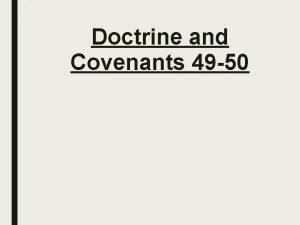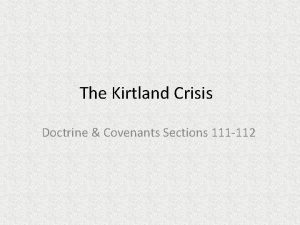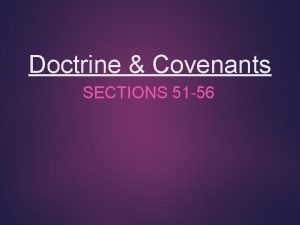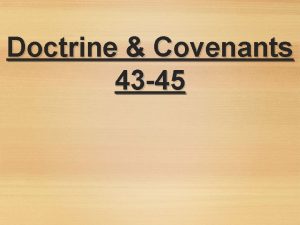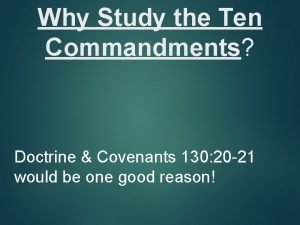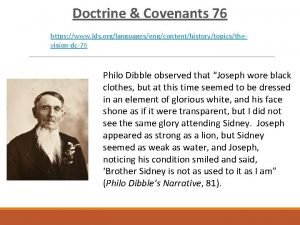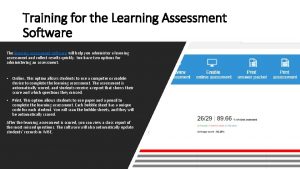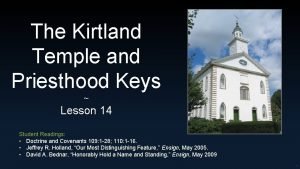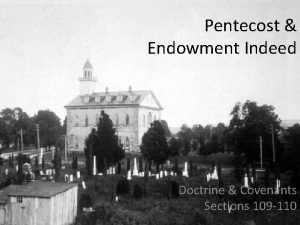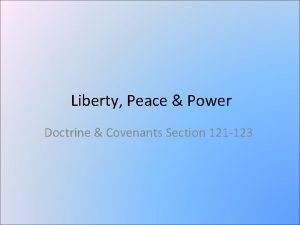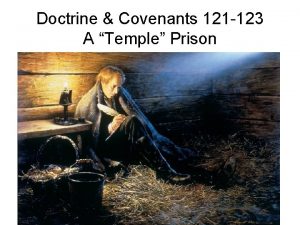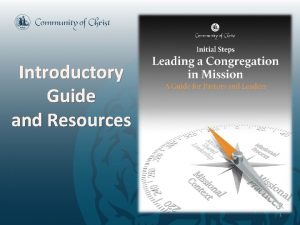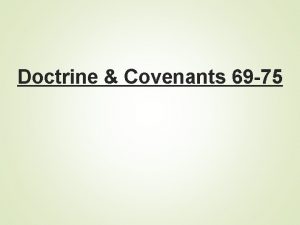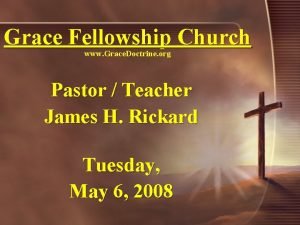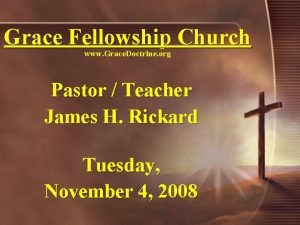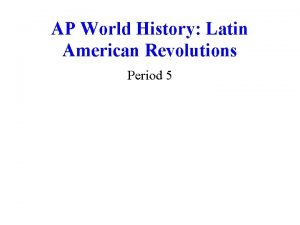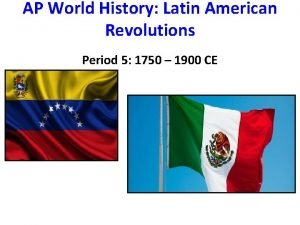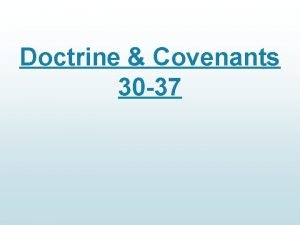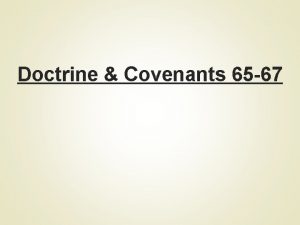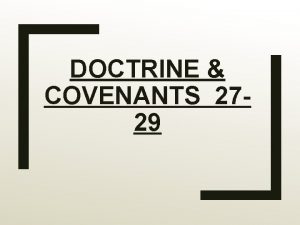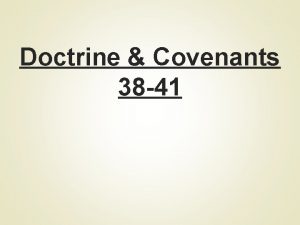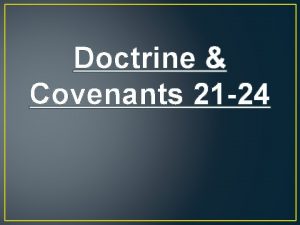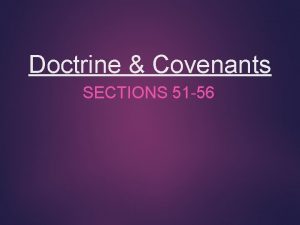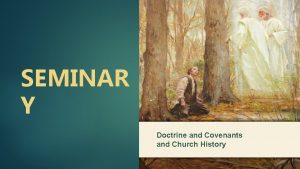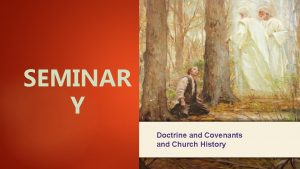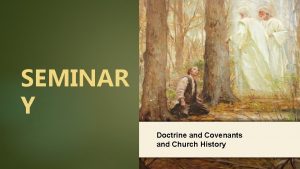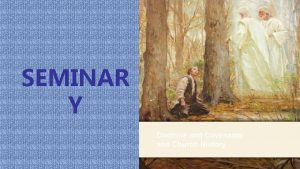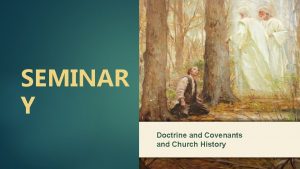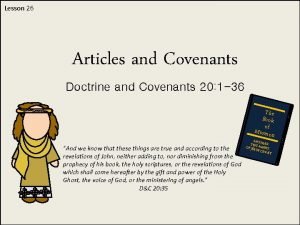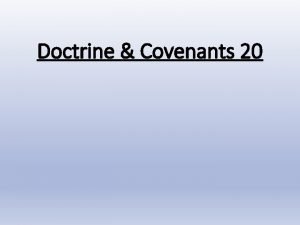SEMINAR Y Doctrine and Covenants and Church History




















- Slides: 20

SEMINAR Y Doctrine and Covenants and Church History

LESSON 9 Joseph Smith—History 1: 27– 54. Doctrine and Covenants 2

LESSON 9 Joseph Smith—History 1: 27– 29 “Joseph Smith prays forgiveness”

LESSON 9 Joseph Smith—History 1: 27– 29 27 I continued to pursue my common vocations in life until the twenty-first of September, one thousand eight hundred and twenty-three, all the time suffering severe persecution at the hands of all classes of men, both religious and irreligious, because I continued to affirm that I had seen a vision. 28 During the space of time which intervened between the time I had the vision and the year eighteen hundred and twentythree—having been forbidden to join any of the religious sects of the day, and being of very tender years, and persecuted by those who ought to have been my friends and to have treated me kindly, and if they supposed me to be deluded to have endeavored in a proper and affectionate manner to have reclaimed me—I was left to all kinds of temptations; and, mingling with all kinds of society, I frequently fell into many foolish errors, and displayed the weakness of youth, and the foibles of human nature; which, I am sorry to say, led me into divers temptations, offensive in the sight of God. In making this confession, no one need suppose me guilty of any great or malignant sins. A disposition to commit such was never in my nature. But I was guilty of levity, and sometimes associated with jovial company, etc. , not consistent with that character which ought to be maintained by one who was called of God as I had been. But this will not seem very strange to any one who recollects my youth, and is acquainted with my native cheery temperament. 29 In consequence of these things, I often felt condemned for my weakness and imperfections; when, on the evening of the above-mentioned twenty-first of September, after I had retired to my bed for the night, I betook myself to prayer and supplication to Almighty God forgiveness of all my sins and follies, and also for a manifestation to me, that I might know of my state and standing before him; for I had full confidence in obtaining a divine manifestation, as I previously had one.

LESSON 9 What are some experiences Joseph Smith had as a youth that you can relate to? According to the end of Joseph Smith—History 1: 28, What did Joseph say about the temptations and errors he fell into? “He was not guilty of any great sins, but he sometimes felt that he did not act as one who had been called of God should act”

LESSON 9 What did Joseph Smith do about the guilt he felt for his sins? “He prayed forgiveness and asked to know of his standing before God” What truths can we learn from Joseph Smith’s example? As we recognize our sins and feel sorrow for them, we can pray to Heavenly Father forgiveness. We can pray to know of our standing before God.

LESSON 9 What do you think it means to know your standing before God? Why might it be important for us to know our standing before God? “[We can] humbly petition the Lord: ‘Father, what wouldst Thou have me do? ’ The answers come. We feel the changes we need to make. The Lord tells us in our mind and in our heart” (“Repent … That I May Heal You, ”Ensign or Liahona, Nov. 2009, 41)

LESSON 9 Joseph Smith—History 1: 30– 35 “The angel Moroni appears to Joseph Smith”

LESSON 9 Joseph Smith—History 1: 30 30 While I was thus in the act of calling upon God, I discovered a light appearing in my room, which continued to increase until the room was lighter than at noonday, when immediately a personage appeared at my bedside, standing in the air, for his feet did not touch the floor.

LESSON 9 Joseph Smith—History 1: 32– 33 32 Not only was his robe exceedingly white, but his whole person was glorious beyond description, and his countenance truly like lightning. The room was exceedingly light, but not so very bright as immediately around his person. When I first looked upon him, I was afraid; but the fear soon left me. 33 He called me by name, and said unto me that he was a messenger sent from the presence of God to me, and that his name was Moroni; that God had a work for me to do; and that my name should be had for good and evil among all nations, kindreds, and tongues, or that it should be both good and evil spoken of among all people. What did Moroni say about Joseph Smith’s future? God had a work for Joseph Smith to do. Moroni said that Joseph Smith’s name would “be had for good and evil among all nations. ” When have you seen examples of this?

LESSON 9 Joseph Smith—History 1: 34– 35 34 He said there was a book deposited, written upon gold plates, giving an account of the former inhabitants of this continent, and the source from whence they sprang. He also said that the fulness of the everlasting Gospel was contained in it, as delivered by the Savior to the ancient inhabitants; 35 Also, that there were two stones in silver bows—and these stones, fastened to a breastplate, constituted what is called the Urim and Thummim—deposited with the plates; and the possession and use of these stones were what constituted “seers” in ancient or former times; and that God had prepared them for the purpose of translating the book. How would the book be translated? By using special stones, called the Urim and Thummim, that God had prepared.

LESSON 9 Joseph Smith—History 1: 36– 49; Doctrine and Covenants 2 “Moroni instructs Joseph Smith”

Joseph Smith—History 1: 36 -42 36 After telling me these things, he commenced quoting the prophecies of the Old Testament. He first quoted part of the third chapter of Malachi; and he quoted also the fourth or last chapter of the same prophecy, though with a little variation from the way it reads in our Bibles. Instead of quoting the first verse as it reads in our books, he quoted it thus: 37 For behold, the day cometh that shall burn as an oven, and all the proud, yea, and all that do wickedly shall burn as stubble; for they that come shall burn them, saith the Lord of Hosts, that it shall leave them neither root nor branch. 38 And again, he quoted the fifth verse thus: Behold, I will reveal unto you the Priesthood, by the hand of Elijah the prophet, before the coming of the great and dreadful day of the Lord. 39 He also quoted the next verse differently: And he shall plant in the hearts of the children the promises made to the fathers, and the hearts of the children shall turn to their fathers. If it were not so, the whole earth would be utterly wasted at his coming. 40 In addition to these, he quoted the eleventh chapter of Isaiah, saying that it was about to be fulfilled. He quoted also the third chapter of Acts, twenty-second and LESSON 9 twenty-third verses, precisely as they stand in our New Testament. He said that prophet was Christ; but the day had not yet come when “they who would not hear his voice should be cut off from among the people, ” but soon would come. 41 He also quoted the second chapter of Joel, from the twenty-eighth verse to the last. He also said that this was not yet fulfilled, but was soon to be. And he further stated that the fulness of the Gentiles was soon to come in. He quoted many other passages of scripture, and offered many explanations which cannot be mentioned here. 42 Again, he told me, that when I got those plates of which he had spoken—for the time that they should be obtained was not yet fulfilled—I should not show them to any person; neither the breastplate with the Urim and Thummim; only to those to whom I should be commanded to show them; if I did I should be destroyed. While he was conversing with me about the plates, the vision was opened to my mind that I could see the place where the plates were deposited, and that so clearly and distinctly that I knew the place again when I visited it.

LESSON 9 Group 1 Doctrine and Covenants 2: 1—Who is Elijah? What priesthood power did Moroni say Elijah would restore? “Elijah was a great prophet with great power given him by God. He held the greatest power God gives to His children: he held the sealing power, the power to bind on earth and have it bound in heaven” (President Henry B. Eyring, “Hearts Bound Together, ”Ensign or Liahona, May 2005, 78) Group 2 Doctrine and Covenants 2: 2—Who are the fathers and the children referred to in this verse? In the prophecy that “he shall plant in the hearts of the children the promises made to the fathers, ” the phrase “the fathers” refers to “Abraham, Isaac, and Jacob, to whom the promises were made. What are the promises? They are the promises of a continuation of the family unit in eternity” (Elder Bruce R. Mc. Conkie, Millennial Messiah[1982], 267). In the prophecy that “the hearts of the children shall turn to their fathers, ” the phrase “their fathers” refers to “our dead ancestors who died without the privilege of receiving the gospel, but who received the promise that the time would come when that privilege would be granted them. The children are those now living who are preparing genealogical data and who are performing the vicarious ordinances in the temples” (President Joseph Fielding Smith, Doctrines of Salvation, ed. Bruce R. Mc. Conkie, 3 vols. [1954– 56], 2: 127).

Group 3 Doctrine and Covenants 2: 3 Why would the earth be utterly wasted if the sealing power had not been restored? “Why would the earth be wasted? Simply because if there is not a welding link between the fathers and the children—which is the work for the dead—then we will all stand rejected; the whole work of God will fail and be utterly wasted” (President Joseph Fielding Smith, Doctrines of Salvation, ed. Bruce R. Mc. Conkie, 3 vols. [1954– 56], 2: 122) LESSON 9

LESSON 9 Joseph Smith—History 1: 44 -45 44 I lay musing on the singularity of the scene, and marveling greatly at what had been told to me by this extraordinary messenger; when, in the midst of my meditation, I suddenly discovered that my room was again beginning to get lighted, and in an instant, as it were, the same heavenly messenger was again by my bedside. 45 He commenced, and again related the very same things which he had done at his first visit, without the least variation; which having done, he informed me of great judgments which were coming upon the earth, with great desolations by famine, sword, and pestilence; and that these grievous judgments would come on the earth in this generation. Having related these things, he again ascended as he had done before.

LESSON 9 Joseph Smith—History 1: 46 -49 46 By this time, so deep were the impressions made on my mind, that sleep had fled from my eyes, and I lay overwhelmed in astonishment at what I had both seen and heard. But what was my surprise when again I beheld the same messenger at my bedside, and heard him rehearse or repeat over again to me the same things as before; and added a caution to me, telling me that Satan would try to tempt me (in consequence of the indigent circumstances of my father’s family), to get the plates for the purpose of getting rich. This he forbade me, saying that I must have no other object in view in getting the plates but to glorify God, and must not be influenced by any other motive than that of building his kingdom; otherwise I could not get them. 47 After this third visit, he again ascended into heaven as before, and I was again left to ponder on the strangeness of what I had just experienced; when almost immediately after the heavenly messenger had ascended from me for the third time, the cock crowed, and I found that day was approaching, so that our interviews must have occupied the whole of that night. 48 I shortly after arose from my bed, and, as usual, went to the necessary labors of the day; but, in attempting to work as at other times, I found my strength so exhausted as to render me entirely unable. My father, who was laboring along with me, discovered something to be wrong with me, and told me to go home. I started with the intention of going to the house; but, in attempting to cross the fence out of the field where we were, my strength entirely failed me, and I fell helpless on the ground, and for a time was quite unconscious of anything. 49 The first thing that I can recollect was a voice speaking unto me, calling me by name. I looked up, and beheld the same messenger standing over my head, surrounded by light as before. He then again related unto me all that he had related to me the previous night, and commanded me to go to my father and tell him of the vision and commandments which I had received.

LESSON 9 How many times did Moroni deliver the message to Joseph Smith? Four times What are some messages that have been repeated in the scriptures, in Church lessons, and in general conference talks? In what ways do we benefit when the Lord and His servants repeat their messages?

LESSON 9 Joseph Smith–History 1: 50– 54 “Joseph goes to the hill and uncovers the record, the Urim and Thummim, and the breastplate”.

LESSON 9 Joseph Smith–History 1: 52– 54 52 Having removed the earth, I obtained a lever, which I got fixed under the edge of the stone, and with a little exertion raised it up. I looked in, and there indeed did I behold the plates, the Urim and Thummim, and the breastplate, as stated by the messenger. The box in which they lay was formed by laying stones together in some kind of cement. In the bottom of the box were laid two stones crossways of the box, and on these stones lay the plates and the other things with them. 53 I made an attempt to take them out, but was forbidden by the messenger, and was again informed that the time for bringing them forth had not yet arrived, neither would it, until four years from that time; but he told me that I should come to that place precisely in one year from that time, and that he would there meet with me, and that I should continue to do so until the time should come for obtaining the plates. 54 Accordingly, as I had been commanded, I went at the end of each year, and at each time I found the same messenger there, and received instruction and intelligence from him at each of our interviews, respecting what the Lord was going to do, and how and in what manner his kingdom was to be conducted in the last days.
 Doctrine and covenants 49 and 50
Doctrine and covenants 49 and 50 Doctrine and covenants
Doctrine and covenants Symonds ryder
Symonds ryder Doctrine and covenants
Doctrine and covenants Doctrine and covenants 21
Doctrine and covenants 21 2 most important commandments
2 most important commandments Doctrine and covenants 76:24
Doctrine and covenants 76:24 La.ldschurch.org/online
La.ldschurch.org/online Priesthood keys restored in kirtland temple
Priesthood keys restored in kirtland temple Doctrine and covenants section 110
Doctrine and covenants section 110 Doctrine and covenants section 121
Doctrine and covenants section 121 James covill lds
James covill lds D&c 121
D&c 121 Doctrine and covenants 1:30
Doctrine and covenants 1:30 Doctrine and covenants 163
Doctrine and covenants 163 Doctrine and covenants 69
Doctrine and covenants 69 Doctrine and covenants 20
Doctrine and covenants 20 Doctrine org
Doctrine org Grace doctrine church
Grace doctrine church Jose de san martin ap world history
Jose de san martin ap world history Latin american revolution definition ap world history
Latin american revolution definition ap world history
